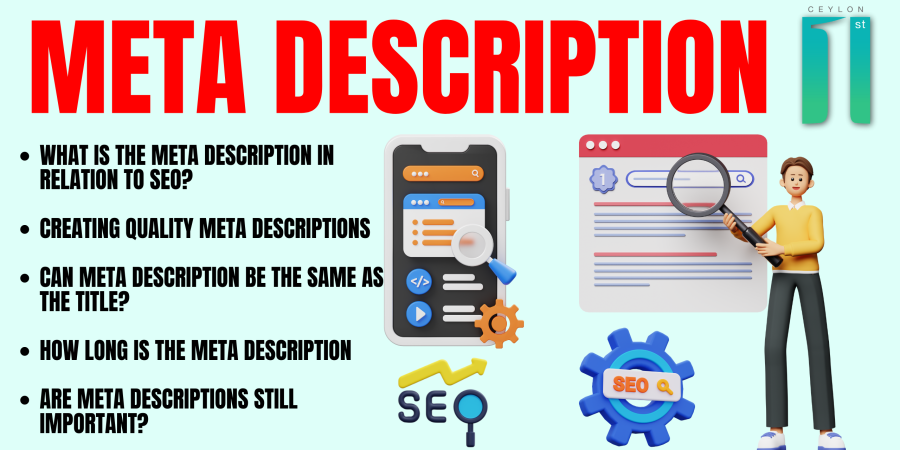A meta description is a brief summary or preview of the content of a web page that appears in search engine results pages (SERPs). It provides a concise description of the page’s content, typically around 150-160 characters in length, and is designed to give users a glimpse into what they can expect if they click on the link. A well-crafted meta description can help attract more clicks and improve the visibility and click-through rate of a web page.
What is the meta description in relation to SEO?
In relation to SEO (Search Engine Optimization), the meta description plays an important role in optimising web pages for search engines. While meta descriptions themselves do not directly impact search engine rankings, they can indirectly influence SEO by improving click-through rates and user engagement.
Here are a few key points regarding meta descriptions and SEO:
- Click-through Rates (CTR): A well-written and compelling meta description can entice users to click on your web page in search results. Higher CTR indicates to search engines that your page is relevant and valuable, potentially leading to improved rankings over time.
- User Engagement: When users find your meta description relevant and click through to your page, it signals to search engines that your content is meeting user expectations. This engagement metric can positively impact your SEO efforts.
- Keyword Optimisation: Including relevant keywords in your meta description can help search engines understand the topic and relevance of your page. However, it’s important to avoid keyword stuffing and focus on creating a concise, natural-sounding description that appeals to users.
- Length and Readability: While search engines may display up to 150-160 characters of your meta description, it’s crucial to convey your message within the first 120-130 characters, as longer descriptions may get truncated. Ensure your meta descriptions are clear, compelling, and readable, encouraging users to click through.
- Unique and Descriptive: Each page on your website should have a unique meta description that accurately represents its content. Avoid using duplicate or generic meta descriptions, as this can diminish the user experience and negatively impact SEO.
In summary, optimizing meta descriptions for SEO involves crafting concise, engaging, and unique descriptions that accurately reflect your page’s content, incorporate relevant keywords, and encourage click-throughs. By doing so, you can enhance your chances of attracting organic traffic and improving your website’s overall search engine visibility.
Creating quality meta descriptions
Creating quality meta descriptions involves several key considerations.
Here are some tips to help you craft effective meta descriptions for your web pages:
- Be Concise: Keep your meta description within the recommended length of around 150-160 characters to ensure it appears fully in search results. Focus on conveying the most important information succinctly.
- Communicate Value: Highlight the unique selling points or key benefits of your web page’s content. Explain why users should click through and what they can expect to find.
- Use Keywords Strategically: Incorporate relevant keywords naturally within the meta description. While meta descriptions don’t directly impact rankings, using keywords can help signal relevance to search engines and catch users’ attention.
- Match User Intent: Understand the intent behind the search queries that may lead users to your page. Craft meta descriptions that align with their needs and expectations. Address the main topic or question your page answers.
- Be Specific and Descriptive: Provide specific details about the content users will find on your page. Use action words or descriptive phrases to create intrigue and encourage clicks.
- Maintain Consistency: Ensure that your meta description accurately represents the content of your web page. Misleading or unrelated meta descriptions can harm user experience and credibility.
- Create a Call-to-Action: Include a compelling call-to-action (CTA) to encourage users to click on your link. Phrases like “Learn more,” “Discover,” or “Get started” can prompt engagement.
- Test and Optimize: Continuously monitor the performance of your meta descriptions and make adjustments as needed. Analyze click-through rates and user engagement metrics to refine your approach.
- Avoid Duplicates: Each page should have a unique meta description. Using duplicate descriptions can confuse search engines and users, potentially leading to lower click-through rates.
- Consider Branding: If appropriate, incorporate your brand name or unique selling proposition into the meta description to increase brand recognition and trust.
Remember that meta descriptions are not a direct ranking factor but influence click-through rates and user engagement, which indirectly impact SEO. By crafting quality meta descriptions that accurately represent your content and appeal to users, you can improve the visibility and click-ability of your web pages in search results.
Can meta description be same as title?
While it is possible for the meta description to be the same as the title, it is generally recommended to make them unique.
Here’s why:
- Different Purposes: The title and meta description serve different purposes. The title is the headline that appears as the clickable link in search results and within the browser’s title bar. It’s crucial for attracting attention and summarising the page’s content. On the other hand, the meta description provides a brief summary of the page’s content and helps users understand what they can expect when they click on the link.
- More Informative: Utilising unique meta descriptions allows you to provide additional information and context about the page’s content that may not fit within the constraints of the title. This can help users make informed decisions about whether to click on your link or not.
- Better User Experience: When searchers see repetitive or identical meta descriptions across multiple pages, it may create confusion and diminish the user experience. Unique meta descriptions enable users to differentiate between pages, making it easier for them to find the most relevant information.
- Keyword Optimisation: The meta description provides an opportunity to include relevant keywords that may not be present in the title. By incorporating these keywords naturally within the meta description, you can help search engines understand the content of your page better.
That being said, there may be instances where the title and meta description naturally overlap or where a slight variation is acceptable. The key is to ensure that each meta description accurately represents the specific content of its corresponding page while providing unique value to users.
How long is the meta description
The recommended length for a meta description is typically around 150-160 characters. However, it’s important to note that search engines measure meta descriptions in pixels rather than characters. This means that the actual visible length of a meta description can vary depending on the width and size of the characters used.
To ensure that your meta description appears in its entirety in search engine results, it’s generally recommended to keep it within the range of 120-130 characters. This ensures that the description is not cut off or truncated, providing users with a complete and concise preview of your page’s content.
While it’s important to be mindful of the length, focus on conveying the most important information within the character limit and crafting a compelling and engaging meta description that entices users to click through to your page.
Are meta descriptions still important?
Yes, meta descriptions are still important for several reasons:
- Search Engine Display: Meta descriptions often appear as the snippet of text beneath the title in search engine results pages (SERPs). They provide a brief summary of the page’s content, helping users understand what the page is about before they click on the link. A well-crafted and enticing meta description can increase the likelihood of users clicking on your website in the search results.
- User Engagement: A compelling meta description can attract users’ attention and encourage them to click through to your website. By accurately representing the content and value of your page, meta descriptions can help set user expectations, resulting in higher click-through rates and improved user engagement metrics. This, in turn, can positively impact your website’s visibility and rankings.
- CTR and Organic Traffic: A higher click-through rate (CTR) from search results indicates to search engines that your page is relevant and appealing to users. While meta descriptions don’t directly affect rankings, they can indirectly impact organic traffic by improving CTR. If users find your meta description compelling and relevant, they are more likely to click on your link and visit your website.
- Branding and Messaging: Meta descriptions provide an opportunity to showcase your brand’s voice, messaging, and unique selling points. By crafting informative and persuasive meta descriptions, you can reinforce your brand identity and attract your target audience.
- Social Sharing: When your content is shared on social media platforms, meta descriptions are often used as the default description for the shared link. A well-optimized meta description can make your content more appealing when shared across various social channels.
While search engines may occasionally generate their own snippets based on the page’s content, having a well-crafted meta description gives you more control over how your page is represented in search results. By optimising your meta descriptions with relevant keywords, compelling messaging, and accurate summaries, you can enhance your website’s visibility, attract more organic traffic, and improve overall user engagement.
CEYLON FIRST



Leave feedback about this